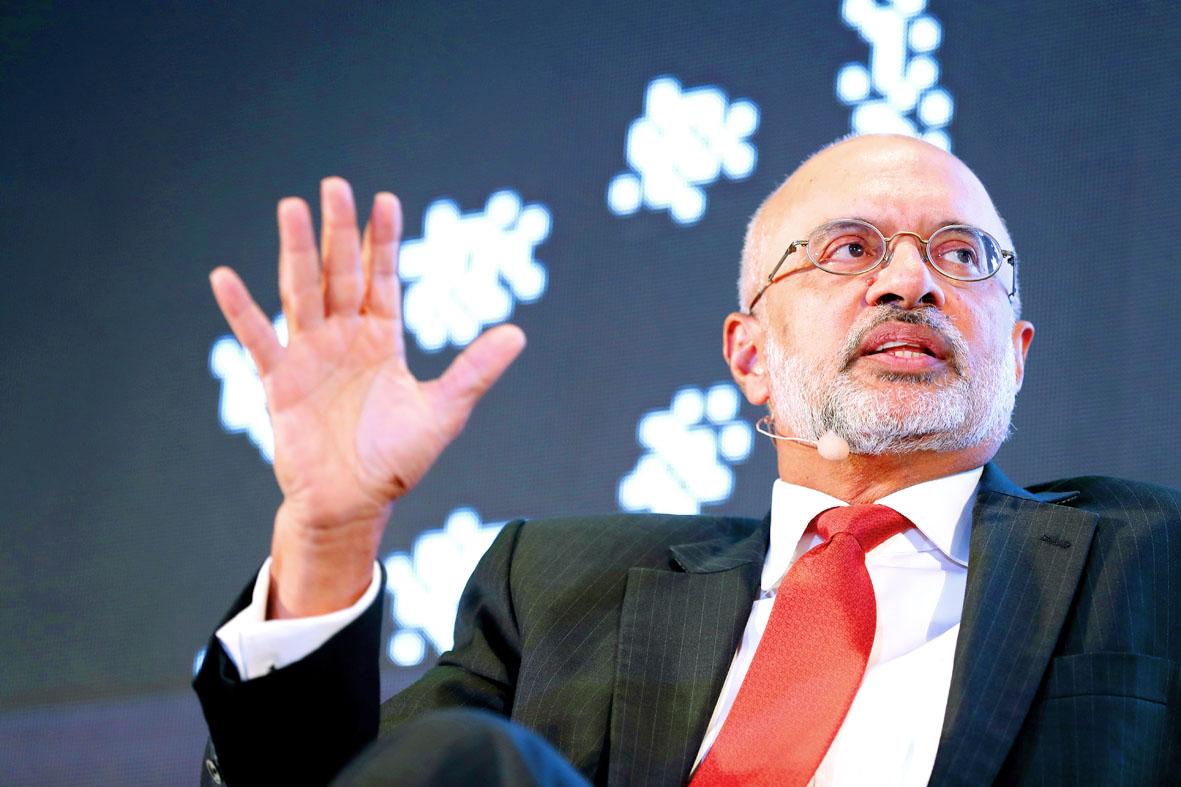DBS Group Holdings Ltd’s top executive welcomes the increased regulatory scrutiny of financial technology companies in China and elsewhere in Asia, saying it would create fairer competition with banks that have been subject to stricter oversight.
“Over time you will start getting a more level playing field, and you’ll start getting a proportionate and even regulatory response to all participants in the market,” CEO Piyush Gupta said in an interview with Bloomberg Television yesterday.
Gupta spoke after being asked for his view on the shelving of Ant Group Co’s (螞蟻集團) initial public offering (IPO) in China as regulators seek to level competition between fintech giants and traditional banks.

Photo: Bloomberg
Ant and other firms in the past few years have grown their financial services in China and beyond, including in Southeast Asia, where DBS is the largest lender.
“Our view has been in the past that many technology companies have been able to benefit from the arbitrage of not having the same regulatory regime and supervision overhead that banks do,” Gupta said. “And so as we get to that stage that’s actually helpful to us.”
China’s top banking watchdog, the China Banking and Insurance Regulatory Commission, is doubling down on a push to rein in financial technology companies such as Ant, promising to eliminate monopolistic practices and enhance risk controls in the industry.
Ant and other firms such as Tencent Holdings Ltd (騰訊) have built dominant positions in payments and online consumer lending over the past decade, free from the oversight applied to traditional financial companies.
Chinese regulators this month outlined new rules to curb the rapid growth and leverage at the nation’s more than 200 micro-lenders, putting a surprise halt to Ant’s US$35 billion IPO.
Ant, along with Tencent-backed Sea Ltd, has applied for Singapore’s digital banking licenses, which could pit them against major rivals such as DBS.
Over the past decade, Gupta has spent billions of dollars upgrading DBS’ technology and digitalization in anticipation of growing competition.
“Where we are today in our core markets, we are reasonably confident that we have what it takes to compete,” Gupta said.
India’s central bank this week asked DBS’ India unit to take over a capital-starved lender in the South Asian nation, in a deal that would see DBS India Ltd pump 25 billion rupees (US$336.9 million) in fresh capital in Lakshmi Vilas Bank Ltd.
While declining to comment on the plans due to pending regulatory approval, Gupta said that the deal would not affect DBS’ dividend payment.
China, India and Indonesia are key regional markets the bank is expanding into, he said.
In China, DBS received approval to set up a brokerage venture where it can own 51 percent.
The bank is to partner with “a couple” of local firms, Gupta said without naming them.
The lender is also growing its presence in the Greater Bay area of southern China and Hong Kong, and would target consumer finance.

UNCERTAINTY: Innolux activated a stringent supply chain management mechanism, as it did during the COVID-19 pandemic, to ensure optimal inventory levels for customers Flat-panel display makers AUO Corp (友達) and Innolux Corp (群創) yesterday said that about 12 to 20 percent of their display business is at risk of potential US tariffs and that they would relocate production or shipment destinations to mitigate the levies’ effects. US tariffs would have a direct impact of US$200 million on AUO’s revenue, company chairman Paul Peng (彭雙浪) told reporters on the sidelines of the Touch Taiwan trade show in Taipei yesterday. That would make up about 12 percent of the company’s overall revenue. To cope with the tariff uncertainty, AUO plans to allocate its production to manufacturing facilities in

TAKING STOCK: A Taiwanese cookware firm in Vietnam urged customers to assess inventory or place orders early so shipments can reach the US while tariffs are paused Taiwanese businesses in Vietnam are exploring alternatives after the White House imposed a 46 percent import duty on Vietnamese goods, following US President Donald Trump’s announcement of “reciprocal” tariffs on the US’ trading partners. Lo Shih-liang (羅世良), chairman of Brico Industry Co (裕茂工業), a Taiwanese company that manufactures cast iron cookware and stove components in Vietnam, said that more than 40 percent of his business was tied to the US market, describing the constant US policy shifts as an emotional roller coaster. “I work during the day and stay up all night watching the news. I’ve been following US news until 3am

Taiwan will prioritize the development of silicon photonics by taking advantage of its strength in the semiconductor industry to build another shield to protect the local economy, National Development Council (NDC) Minister Paul Liu (劉鏡清) said yesterday. Speaking at a meeting of the legislature’s Economics Committee, Liu said Taiwan already has the artificial intelligence (AI) industry as a shield, after the semiconductor industry, to safeguard the country, and is looking at new unique fields to build more economic shields. While Taiwan will further strengthen its existing shields, over the longer term, the country is determined to focus on such potential segments as

COLLABORATION: Given Taiwan’s key position in global supply chains, the US firm is discussing strategies with local partners and clients to deal with global uncertainties Advanced Micro Devices Inc (AMD) yesterday said it is meeting with local ecosystem partners, including Taiwan Semiconductor Manufacturing Co (TSMC, 台積電), to discuss strategies, including long-term manufacturing, to navigate uncertainties such as US tariffs, as Taiwan occupies an important position in global supply chains. AMD chief executive officer Lisa Su (蘇姿丰) told reporters that Taiwan is an important part of the chip designer’s ecosystem and she is discussing with partners and customers in Taiwan to forge strong collaborations on different areas during this critical period. AMD has just become the first artificial-intelligence (AI) server chip customer of TSMC to utilize its advanced